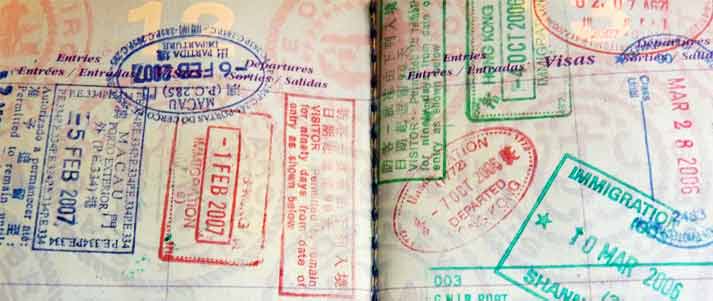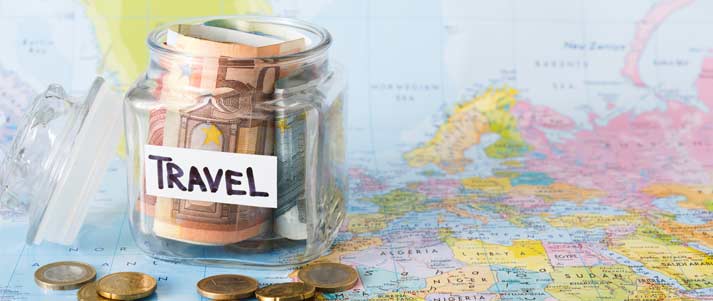Student travel insurance deals
Got a holiday planned but still yet to get travel insurance? For less than a tenner, you can properly relax on holiday knowing that you're fully covered – here's how.

Credit: Jacob Lund – Shutterstock
Nobody likes thinking about worst-case scenarios when getting excited about their holidays.
But if you can spare a minute between daydreaming about the sun, sea and sangria after the last months of revision and exam stress, we'd seriously advise spending a small bit of cash on a student travel insurance policy to cover yourself in case something goes wrong.
The good news is that if you do your research and you're smart about which policy you choose, it doesn't have to cost much more than two pints of beer. Here's what you need to know.
What's in this guide?
Best student travel insurance
While it's harder to get student-focussed travel insurance than it used to be, here are some of the best travel insurance companies to check out:
-
Coverwise
While not student-focused, Coverwise offers pretty good rates so it's worth getting a quote from them.
Planning to work abroad at any point during your degree? Have a look to see if an insurance policy from Coverwise would cover you.
Their website says they can offer cover for students who are working as councillors or on university exchanges for practical non-manual coursework.
-
World Nomads
World Nomads offer two insurance plans: Standard and Explorer. The Standard Plan is a bit cheaper but does give you less coverage.
They also cover more than 150 adventure activities. So, whether you're planning to go mountain biking, scuba diving or bungee jumping, you're good to go.
World Nomads has also set up the Footprints programme. This lets you add a small donation that goes directly to local communities and charities. At the time of writing, they've already donated over $3.7 million (around £3 million)!
-
Admiral
Admiral offers both single trip and annual multi-trip coverage, which includes many activities. For example, you can get extra coverage if you're going skiing or going on a cruise.
They offer 5 Defaqto star travel insurance, so a lot of things are included. And, they come at a decent price.
Do you need travel insurance?
The short answer is: YES, you should always take out a travel insurance policy.
Most holidays go swimmingly. But if something does go wrong while you're out of the UK, you can end up with a serious bill that could've been avoided with one small payment before you set off. It's a no-brainer.
The US and Australia, for example, have notoriously expensive healthcare. If you're unlucky enough to fall out of a hammock and break an arm while chilling in Surfers Paradise, you'll be in a pickle without a policy that fully covers you.
Without travel insurance, even minor accidents can end up costing you a small fortune. Plus, if one of your possessions is stolen while you're away, you'll be kicking yourself for not getting insurance.
So, for that extra peace of mind, it's worth investing a bit of cash into travel insurance.
EHIC and GHIC card
If you have an EHIC (European Health Insurance Card) that's still in date from the time that the UK was in the European Union, this will give you basic healthcare at a reduced cost when visiting any countries within the EU, Norway, Iceland, Liechtenstein and Switzerland.
In general, new applications for EHIC cards will get you a UK Global Health Insurance Card (GHIC) instead. GHIC cards, like EHIC cards, will let you access state healthcare in Europe for free, or at a reduced cost. The only difference is this card can only be used in countries within the EU and Switzerland.
These cards are free. All you need to do is submit an online application.
Make sure you only apply via the official website. The internet is full of scam sites trying to charge for EHIC/GHIC applications.
Though the card is really handy, having one in your wallet isn't a substitute for health insurance. The EHIC/GHIC won't cover you for anything other than basic medical treatment.
As such, if you need to rearrange your travel plans due to an accident and don't have travel insurance, you'll be on your own when it comes to covering the cost.
What does travel insurance cover?

Credit: Andrey Armyagov – Shutterstock
Travel insurance policies can cover you for all sorts of things. Each one is different. Always read the fine print and find out what your policy includes before agreeing to anything.
Are you planning on getting involved in some sports or adventure activities while you're away? If so, you'll need a policy that explicitly states you're covered if you have an accident as a result.
It might cost a few more quid, but there's no point in buying a cheaper insurance policy that won't pay out. Plus, travel insurance is usually pretty cheap anyway, so the difference should be negligible.
What to include in your travel insurance policy
Here are the main things we'd recommend including in your travel insurance policy:
- Medical cover of at least £2 million – This might sound like a lot, but when you consider that an overnight stay in a US hospital could cost thousands of pounds, you'll understand that this sort of coverage is pretty crucial. Imagine how the costs could stack up if you fell ill with something serious.
- Personal liability cover of £1 million – This is basically the amount you'll be covered for if you cause injury to someone else, or damage someone else's property.
- Around £3,000 in cancellation cover – If your flight is cancelled or you miss a connection due to delays, this will have you covered. If the airline your flight is booked with goes bust, this will be instantly refundable provided you paid by credit card. So, it's a good idea to use a credit card rather than a debit card when booking your flights.
- £1,500 in case of loss of baggage – If you're convinced that your Primarni clothes probably aren't worth this much, then you could go for a policy that offers a bit less. But definitely, get covered for lost baggage. It happens a lot more often than you'd think. And even if your baggage turns up later, you can usually claim for the new clothes you had to buy in the meantime.
- £250 in case of loss of cash – It can be hard to find a policy that will dish out much more than this amount when it comes to loss of cash. This is largely because carrying large amounts of money around with you isn't too smart. Grab yourself a decent credit card or debit card that doesn't impose charges on international withdrawals, so you can dip in as many times as you need to.
Any policies offering less than this aren't really advised. And remember: paying a bit extra on your policy could save you thousands if the worst-case scenario happens.
Also, don't forget to check the excess. Your excess is the amount that you agree to pay upfront in the case of an emergency, which will then be topped up by your provider.
For example, you may be covered for £1,000 of lost baggage, but have an excess of £100. This means that you'd have to pay the first £100 towards the cost, with your insurer paying the rest.
The lower the excess, the more you'll pay for the policy itself, and vice versa. You can save a bit on your policy if you agree to pay more in excess.
However, as travel insurance tends to be pretty cheap either way and the amounts you may end up claiming for are so large, it's worth seeing how much difference the excess actually makes to the cost of your policy.
What doesn't travel insurance cover?

Credit: Megan Eaves - Flickr
There are a few details worth knowing about travel insurance before you commit to a policy.
Insurers are there to reassure you that you'll be financially covered if something goes wrong. But don't see this as a green light to do whatever you want on holiday and lose all sense of responsibility!
Here are a few things that travel insurance companies typically won't cover you for:
- Most policies won't cover you if you've been drinking alcohol or taking illegal drugs. If you're planning to party a lot while you're away, you'll need to take extra care. If you injure yourself while drunk, medical staff will have to disclose this in your hospital records. This could prevent you from being able to make a claim for medical costs.
- Existing health conditions can seriously affect whether or not your insurance provider will pay out. If you do have any health conditions, declare them when you're buying the insurance. Honesty goes a long way in this game!
- If your items are stolen from an unattended vehicle, or you leave your bag on the beach or in the overhead compartment on a train, you probably won't be covered.
- If you wait around and don't report your situation quickly enough (usually within 24 hours) it may void the claim. So, stop your sunbathing routine for two minutes and make that call.
- If you contract a tropical disease that you should've been vaccinated for before arriving, this could prevent you from being able to claim.
- If you have an accident as a result of not taking a relevant safety precaution, like wearing your seatbelt or a helmet, this could also void your claim. Break your arm falling out of a hammock, however, and you'll probably be covered.
- If you've chosen to travel to an area that the Foreign, Commonwealth and Development Office (FCDO) advises against, your standard travel insurance policy won't be valid. If this is your situation, check out specialist insurance companies. Although, as you might expect, policies will be a lot more expensive for these regions.
Also, driving abroad isn't usually covered by travel insurance. Sometimes it can be, though, so it's worth looking into.
If you do plan to drive when on holiday, you might be able to get covered through your car insurance provider. Try checking with them first.
How to make a travel insurance claim
It's normally a requirement that you file your claim within 24 hours (most insurance companies offer a hotline that runs 24/7).
So, if you need to report something, call them as soon as possible. Keep the telephone number handy, just in case you do need it.
Before you call them, think carefully about the situation. Write down the specifics so you can provide any details they ask for.
Providing a travel insurer with evidence
If you're reporting a theft, you'll have to provide them with the details of what happened, as well as a crime reference number from the local police department. So, make sure you report it to the authorities beforehand.
Another thing insurers might ask for is photographic evidence that you owned the stolen item(s). Therefore, it's a good idea to lay out everything of value on your bed before you leave and take a photo of it all. You can then send this to the insurers as proof of ownership when filing your claim.
If you're sick, some insurers will arrange to pay the hospital directly if you need treatment, but do clarify the procedure before paying for your policy.
And, if you pay for something that you expect to be refunded by the insurance company at a later date (for example, emergency accommodation if your flight is cancelled), make sure you keep all receipts so you can prove exactly how much everything came to.
Which type of travel insurance policy to go for

When you're choosing a policy, you'll first be faced with two main options: single trip or multi-trip/annual cover.
As you might have guessed, single cover will insure you for just one trip (normally up to around 31 days). Annual cover will insure you for every holiday you take over the next year.
Price-wise, if you plan to go abroad more than once in the year, it'll probably be worth taking out annual cover. It's often around the same price as two single-trip policies anyway.
If you're planning a longer trip such as a backpacking holiday or a gap year, you'll need to take an annual policy. There are often special policies specifically for trips like these, so keep your eyes peeled.
Where to buy travel insurance
As much as we'd love to tell you which travel insurance policies are the best, it really does depend on what kind of trip you're going on.
Prices will vary depending on whether you need gadget cover or you're going skiing, for example. Your best bet is to use a comparison site to find the best deals.
There are loads out there, but some good places to start are:
Check out our guide to the best comparison websites for the full selection.
Comparison sites will even let you filter results by certain requirements. If, say, you want medical cover of at least £2 million, you can filter to only see policies that provide that.
What is the Defaqto Rating?
You'll notice that each policy is displayed next to a Defaqto star rating, ranging from one to five.
This rating basically indicates how comprehensive the cover is. A five-star policy will cover a lot more than one with just one star.
However, you might not always need those extra add-ons, especially if you're just going on a weekend break.
The Defaqto rating indicates how extensive policies are, but not necessarily whether they're right for you.
Just in case you need an excuse to travel more, we know of a few ways travelling makes you more employable.











